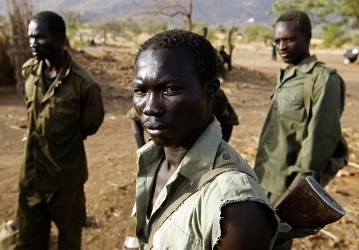Sudan, SPLM-N expected to resume talks in Addis Ababa: negotiator
November 18, 2013 (KHARTOUM) – Sudanese government and Sudan People’s Liberation Movement-North (SPLM-N) will resume talks during the upcoming days under the auspices of the of the African Union High Implementation Panel (AUHIP), a government negotiator said

He further stressed that government’s decision to resume negotiations with the SPLM-N was not a result of external pressure.
Last week, the Sudanese chief negotiator Ibrahim Gandour announced readiness to resume negotiations with the rebels in the Blue Nile and South Kordofan states on the basis of the Comprehensive Peace Agreement (CPA) and the United Nations Security Council (UNSC) resolution 2046, which says the 28 June framework agreement should serve as basis for talks.
Gandour statements came after the failure of the two parties to meet in Addis Ababa on 4 November to discuss technical plans for a polio vaccination campaign in the South Korodfan and Blue Nile states. The government said it did not receive an invitation for that meeting.
UN humanitarian coordinator John Ging slammed the two parties and called on the UN Security Council to intervene in a different and effective manner to allow the conduct of the campaign, adding their behaviour threatens UN efforts to eradicate polio in the planet.
Hamdi pointed that the military summer campaign announced recently by the Sudanese Armed Forces (SAF) doesn’t mean a declaration of war, saying that contacts between the negotiating team and the AUHIP are ongoing.
“In the past few days we had direct talks with the mediators on the possibility of resuming negotiations on the Two Areas”, he added.
He held the SPLM-N responsible for the failure of the previous round of peace talks and saying that rebels don’t have a will and desire for dialogue and peaceful solution.
Last April, the first round of talks since 2011 between the SPLM-N and the Sudanese government in the Ethiopian capital Addis Ababa adjourned without success in bridging the wide gap between the two sides.
The government, at that time, said it would only discuss the resolution of the conflict on the basis of the 2005 peace agreement. The SPLM-N, on the other hand, said can only negotiate a cessation of hostility to allow humanitarian access for the civilians in the rebel held areas.
Alluding to the government rejection for comprehensive talks, Hamdi said that the government negotiating team would only engage in negotiations regarding the Two Areas.
“We have full confidence on the AUHIP as a serious mediator”, he added.
He asserted that several regional and international parties seek to abort negotiations through the SPLM-N negotiating team as they did in the previous rounds.
“The rebels don’t want to take off the foreign cloak, and Arman’s [SPLM-N secretary general] recent statements emphasise that the SPLM-N will is controlled by foreign parties”, he added.
He pointed that the government abides by the principles and foundations of the international community as represented by the UNSC and the AUHIP.
The Sudanese negotiator wished that the SPLM-N comes to the negotiating table free of agendas of other opposition groups which are not part of the talks.
The SPLM-N and its allied rebel groups of Darfur region call for a comprehensive solution to all of Sudan’s problems that entails having a democratic transformation and warned Khartoum that rejecting such approach will unite its opponents behind toppling the regime.
Khartoum, however rejects the demand for holistic approach and proposes to engage separate processes with the SPLM-N and Darfur rebel groups.
The African Union and the UN Security Council also support the position of the Sudanese government, underlining that democratic reforms can be engaged after the end of the conflicts. However some Western governments said openly they are favourable to comprehensive approach.
The Sudanese rebel groups of the Sudanese Revolutionary Front are touring Europe in a bid to persuade the EU countries to support their call for holistic talks.
(ST)
